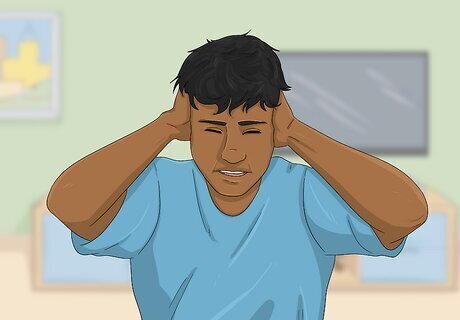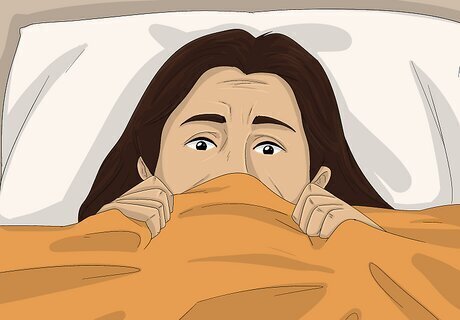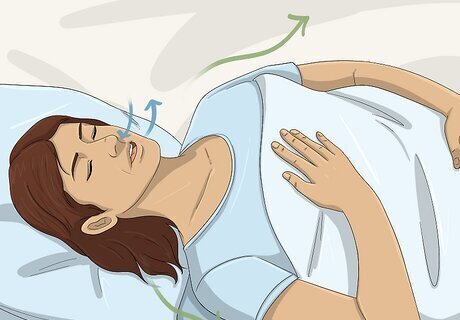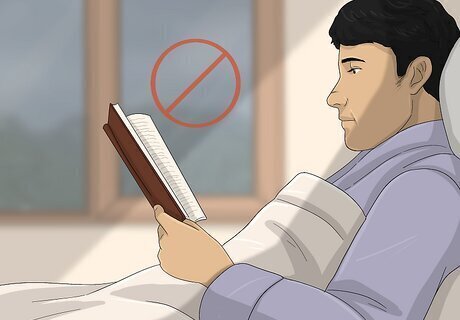
views
Taking Action During the Day

Don't dwell on your nightmares. Even though they may be truly terrifying and stick with you, try your best not to worry about them. Allowing them to cause your more stress and fear will only increase the likelihood of more nightmares in the future. Try to focus on positive life events instead of fear and worry. Thinking of a safe space or a loved one will help keep your mind in a positive space. Think of how much better your sleep is becoming now that you are improving it. Dreams are the product of your mind processing and working through things—they are rarely a reflection of the future.

Don't take your worries to bed with you. As much as possible, leave any fears or concerns behind you as you lay down to sleep. Dwelling on these negative things as you fall asleep will only increase the likelihood of having a bad dream. As you fall asleep, focus your mind on the rhythm of your breath. Gently and naturally, follow your inhalations and exhalations with your mind. If your mind wanders, refocus on your breath. Focusing on your breath will allow your thoughts to pass by without disturbing your sense of calm. Try not to dwell on any thoughts as you fall asleep. Let your thoughts pass by without focusing on them or making judgements about them.

Watch your thoughts closely. Throughout the day, pay careful attention to your thoughts. If you find yourself starting to blow your fears and worries out of proportion, stop. Catch these thought patterns and instead focus on positive aspects as best you can. Keeping your problems in perspective will save you unneeded stress. Don't exaggerate any causes of stress, be as objective as you can.

Practice visualizing a safe space. If you feel too stressed or find yourself focusing on negativity, try imagining a safe space. By visualizing a safe space, you can find relief from the source of your anxiety for a time, allowing you to return relaxed and refocused. Find a real, physical space that you can get comfortable in. Start to imagine your safe space. Your safe space can be any place at all, real or imagined, that makes your feel secure and relaxed. Use all of your senses in your imagining of your safe space. See, hear, smell, feel, and maybe even taste your secure and safe space. Be aware of your body and any tension you are carrying. Release and relax that tension as you enjoy your safe space. Be in your space for for at least five to ten minutes. When you feel relaxed, slowly return by opening your eyes and calmly sitting for another minute.

Examine your actions. Negative emotions can lead to behaviors that will only cause further negative emotions. If you find yourself engaging in negative, risky, or impulsive actions, stop. Stop any risky, impulsive, or self-destructive behaviors immediately. Excessive alcohol consumption is a good example of a dangerous behavior to cut out of your life. Replace these with healthy and beneficial outlets for your feelings. If you are under stress, try reacting with an activity such as physical exercise or peaceful meditation.

Use imagery rehearsal therapy. If your nightmares have repetitive elements or happen frequently, you can use imagery rehearsal therapy to rewrite your bad dreams. Follow these steps to take control of your nightmare: If you have a recurring nightmare, write it down in detail. Make any changes you want with your nightmare or write an entirely new dream that you want to have. For example, if you encounter a monster in your nightmare, try changing it into a kitten. Before bed, and throughout the day, imagine your new dream with the changes you made. Visualize the new narrative and remind yourself that this is how the dream is now. Be confident that this new dream is the one you will experience instead of the old nightmare.
Learning More About Nightmares

Learn the main causes of nightmares. Nightmares occur in both adults and children. Despite being a dream, nightmares are a real symptom of something that needs addressing in your waking life. The two main causes of nightmares are: Stress. Major life event, such as the loss of a loved one or trauma.

Discover other causes of nightmares. Beyond the two main causes of nightmares, stress and trauma, there are a multitude of additional potential causes. Examine the following possible causes of your nightmares to see if any of them are applicable to your situation: A new drug prescribed by your healthcare provider. Certain medications could cause nightmares as a side effect. Interactions with existing prescriptions and any new medications could also be responsible. Ask your doctor about any new prescriptions and if they may be responsible for your nightmares. Drinking too much alcohol. Alcohol consumption can cause nightmares by interrupting deeper levels of sleep, when dreams often occur. Reduce alcohol consumption to improve sleep quality and reduce the frequency of nightmares caused by heavy alcohol usage. Eating just before going to bed. When you eat before bed, your metabolism increases, keeping you awake and preventing you from having deep, restful sleep. Avoid any snacks before bed to sleep better and lower the chances of having a nightmare. Illness with a fever. Being ill, especially with a fever, can interrupt sleep patterns and cause nightmares. After you recover from the fever or illness, your nightmares should reduce in frequency. If they do not, talk with your doctor and look for another possible cause together. Stopping certain prescriptions. Ending your usage of a prescription, with a doctor's order, can be responsible for nightmares. If you are experiencing nightmares after ending a prescription, ask your doctor if this may be responsible and what to expect as you end the medication.

Examine your nightmares for repetition. Your nightmares may have common elements or will be exact repeats of previous nightmares. If you have the same nightmare consistently there may be unique causes behind this type of nightmare. The two main causes repeating nightmares are: Post-Traumatic Stress Disorder (PTSD). 71% to 96% of those with PTSD have been found to have may have nightmares. PTSD is caused by a terrifying event, either witnessed or undergone directly. Severe anxiety or depression. Suffering from either severe anxiety or depression can cause repetitive nightmares. Work with your doctor, therapist, or counselor to help reduce your anxiety or depression, which will in turn help to stop your nightmares.

Learn the differences between bad dreams, nightmares and sleep terrors. Bad dreams, nightmares, and sleep terrors are considered to be different events. They all have their own characteristics, and knowing which one you are experiencing, can help you to gauge what level your nightmares are at. Bad dreams are unpleasant dreams and they do not awaken you. Nightmares have the images and sounds of a dream, and are so terrifying that you awaken. Sleep terrors have no images or dreams, only an extreme feeling of terror and sometimes sleep paralysis.

Talk to your doctor. Your doctor may be able to provide a prescription, or recommend an over-the-counter sleep aid, to help you combat your nightmares. Medications for nightmares are not for everyone, and may only work in certain cases. Some of the more common over-the-counter sleep aids are: Melatonin. Melatonin is a hormone that is produced by your body and it controls your sleep-wake cycle. Effects may be mild but melatonin should increase the likelihood that you will fall asleep easier. Melatonin may cause headaches and daytime sleepiness as side effects. Doxylamine succinate (Unisom Sleep Tabs). Doxylamine is an antihistamine and has a sedating effect. You may notice side effects such as daytime drowsiness, dry mouth, blurred vision, constipation and urinary retention. Valerian. Valerian is a plant that is used as a sleep aid. Studies are divided as to its effectiveness. There are generally no side effects when using Valerian. Diphenhydramine (Benadryl, Unisom SleepGels, others). Diphenhydramine is another antihistamine with a sedating effect. The drowsiness caused by diphenhydramine can help you to fall asleep. Pay attention to side effects such as daytime drowsiness, dry mouth, blurred vision, constipation and urinary retention. Sleep aids may leave you feeling tired and groggy during the day. Medication interactions are possible with sleep aids. Side effects and safety are uncertain with many sleep aids. Ask your doctor if sleep medications are right for you.
Improving Sleep

Improve your sleep. Take actions to make the quality of your sleep improve. Poor sleeping habits can make nightmares more likely to occur. Take some of the following steps to help get a good nights rest: Get regular exercise. Exercise helps you fall asleep faster and sleep more deeply. Limit caffeine and alcohol. Both can reduce the quality of your sleep. Make time for activities that you enjoy. Practice meditation or relaxation techniques. Have a regular sleep schedule. Go to bed and wake up at the same time everyday.

Tense and relax your muscles as you fall asleep. Start with your head and shoulders, tense and release those muscles. Work your way down your body, tense and release each area. Doing this has been proven to reduce the occurrence of nightmares by up to eighty percent. By tensing your muscle first, you allow for a deeper relaxation of it. You can do this many times a day, in addition to right before bed.

Make your bedroom a place for sleep only. Don't do any other activities in your bedroom that would be counted as “waking” activities. By mentally establishing that your bed is a place for sleep and rest alone, you will be able to fall asleep more quickly and more deeply. Avoid any activities, even simple ones such as reading or watching TV, while in your bed. Only go to bed when tired and ready for sleep.




















Comments
0 comment